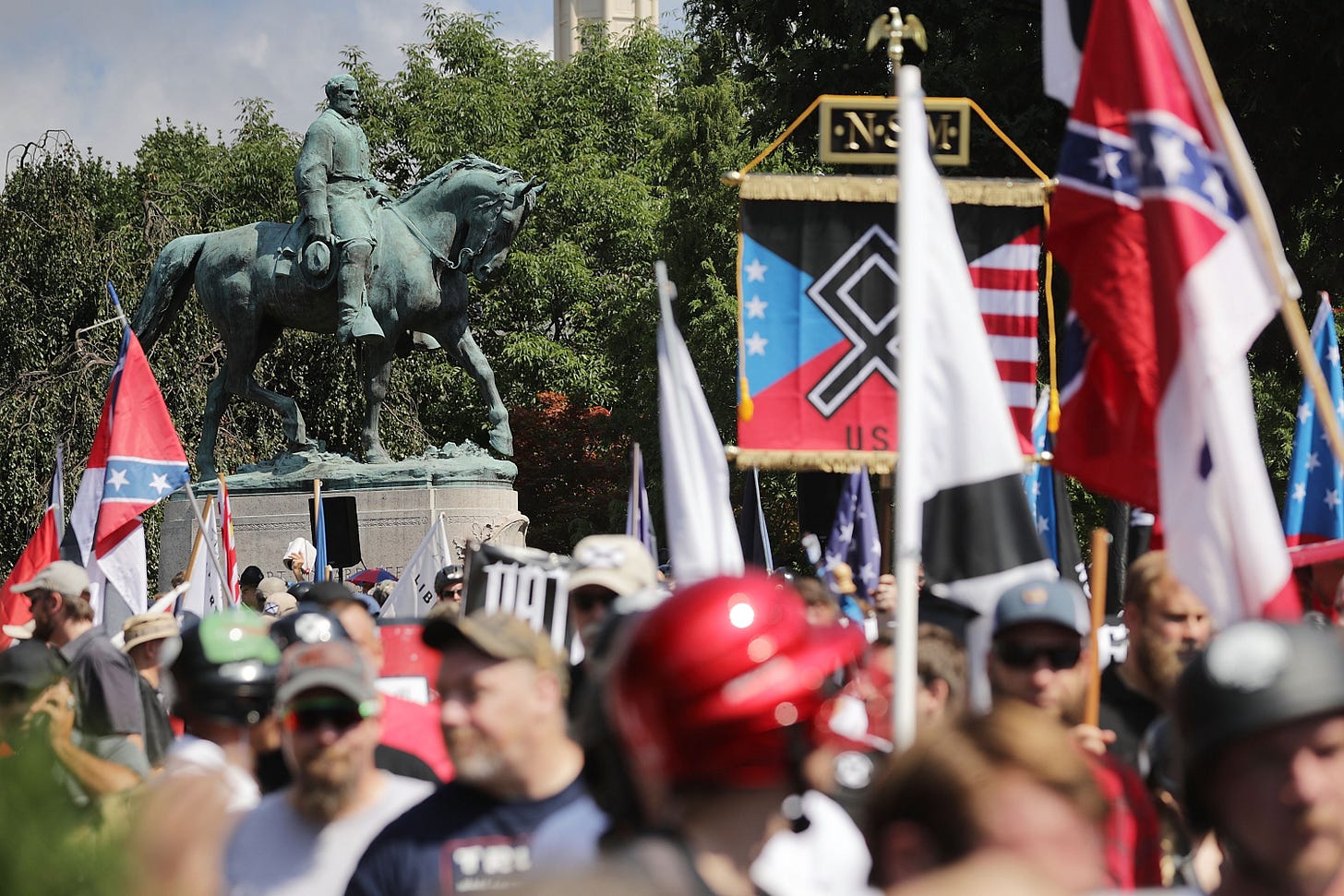
Why Trumpworld Keeps Gaslighting About the 'Charlottesville Hoax'
Donald Trump's supporters really, really, really, really believe their own narrative.

One downside of having our nation’s president also function as its most prolific pundit is that we often spend less time talking about the news than we do talking about our talking about the news. Consider, for example, the interminable debate over how the president responded to white nationalist violence in Charlottesville two full years ago.
On Tuesday, President Trump retweeted a video from Steve Cortes, a staunch Trump supporter who appears on CNN regularly and who has spent much of the last year railing that the media has constructed a revisionist history of how Trump responded to the “Unite the Right” rally in Charlottesville. It was the president’s most prominent endorsement yet of a theory that has been gaining steam: Actually, Trump denounced the white nationalists at Charlottesville vociferously, and if you remember otherwise, it’s only because the media has planted a lie in your minds. In the slick video produced by PragerU, Cortes argues that the common characterization of Trump’s response—that Trump provided cover for white nationalists by equivocating that there were “very fine people” on both sides at the rally—is a deliberate lie:
“The press conference itself was racuous. The media was antagonistic. The president was combative. Out of it all, one phrase eclipsed the thousands of words exchanged. The media reported that President Trump described neo-Nazis as ‘very fine people.’ Only, he didn’t. In fact, he condemned the neo-Nazis in no uncertain terms.”
Quoting from Trump’s now-infamous third-try press conference from days after the shooting, Cortez zeroes in on the “very fine people” statement: “He was referring to another group of Charlottesville demonstrators who came out that weekend—protesters who wanted the Robert E. Lee statue removed and protesters who wanted to keep the statue and restore the park’s original name… A few moments later, in case there would be any misunderstanding, he makes his meaning even more explicit: ‘I’m not talking about the neo-Nazis and the white nationalists. They should be condemned totally.’”
The sleight-of-hand happening here is old news to anyone who’s paid attention to the evolution of this narrative. The reason Cortes doesn’t actually quote any media outlets when he alleges that “the media reported that President Trump described neo-Nazis as ‘very fine people’” is because no news outlets reported such a thing. It’s a convenient invention for the sake of the story Cortes is trying to tell.
The reason commentators zeroed in on the “very fine people” statement wasn’t because Trump said explicitly that neo-Nazis were some of the good guys. It was because the narrative he was pushing—that the Charlottesville rally was by and large an innocuous affair, and that to the extent it turned sour bad apples on both sides were equally to blame—failed to reckon with the fact that the Charlottesville rally was unmistakably a white nationalist rally, headlined by America’s most prominent white nationalist, Richard Spencer, sporting Confederate flags on official posters. After that rally erupted in violence, the president’s days of mealy-mouthed “both sides” rhetoric were widely criticized. The “very fine people” remark came to be seen as a shorthand for that controversy, but was far from the only troubling thing he said.
There’s plenty of other problems with the narrative, as Jane Coaston wrote for Vox and Robert Tracinski wrote for The Bulwark earlier this year. Here's Tracinski:
He was referring to a specific group of protesters present in Charlottesville on the night of August 11. And this was the context in which Trump denied that he was talking about white nationalists.
And you had people, and I’m not talking about the neo-Nazis and the white nationalists, because they should be condemned totally. But you had many people in that group other than neo-Nazis and white nationalists. Okay? And the press has treated them absolutely unfairly.
All right, so who are these people who were just there to protest the removal of the statues? Who was the group protesting “the night before”?
...
The people marching in Charlottesville the night before were the guys with torches chanting “blood and soil” and “Jews will not replace us.” It takes very little digging to knock down the battlements Cortez is building here. So the great mystery is: Why do Trump and his allies keep pushing it? Wouldn’t it be better to keep their heads down and try to let the event fade into the past?
The answer seems to be that the president and his allies have decided that there is no subject for which establishing an ecosystem of competing irreconcilable narratives is a bad political move. In all of this talking about talking, it barely matters who’s right: The bare fact that it happens accomplishes the president’s purposes for it.
President Trump and his allies aren’t interested in the specifics. They don’t want to give an account for whether his post-Charlottesville remarks gave cover to white nationalists, just as they didn’t want then to give an account for whether his racially charged campaign had emboldened white nationalists to gather in Charlottesville in the first place. Their only use for these sorts of specifics is as a way of muddying the waters just enough to refocus their supporters’ attention on the only issue they think really matters: That the media and Democrats are in cahoots, that they fear you, that they hate you, that they want to destroy your way of life, and that only President Trump can stop them.
And if that's the case, Charlottesville is as good a place to fight that battle as any.










